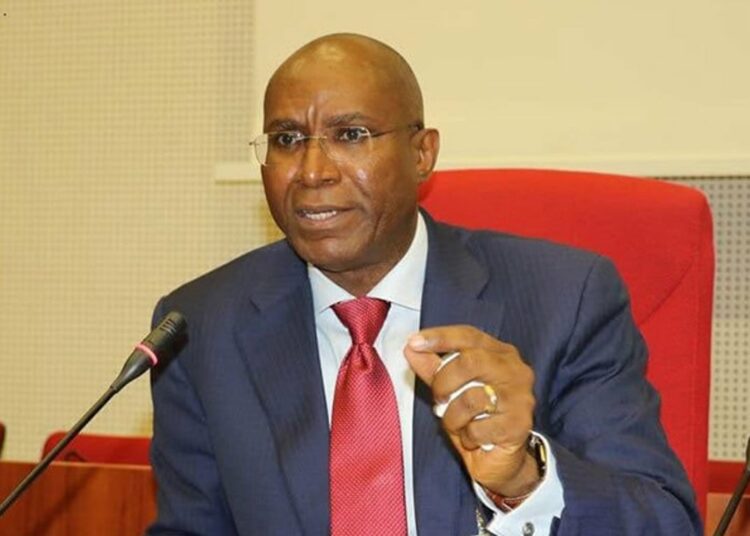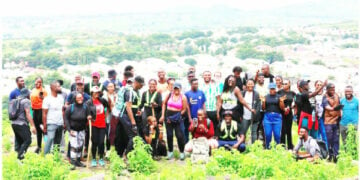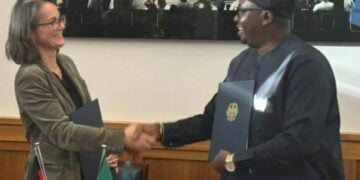Fear of former Deputy Senate President, Senator Ovie Omo-Agege, is reportedly driving the Delta State chapter of the All Progressives Congress (APC) into hastily endorsing Governor Sheriff Oborevwori ahead of the 2027 governorship election timeline.
Political analyst, Basil Okoh, said the governor’s growing anxiety and overreliance on President Bola Tinubu’s name reflect deep insecurity within the party’s ranks.
According to Okoh, in a trending article online, said that the meeting held on Sunday at the Banquet Hall of Government House, Asaba, was convened to hastily project Oborevwori as the sole APC governorship candidate in Delta, adding that phones were reportedly confiscated, and attendees were barred from taking photographs — a clear sign, he noted, that “the meeting was driven by fear, exclusion and anxiety over one man’s silence.”
That silence, Okoh stressed, was Omo-Agege’s calculated quietness, which now defines the political atmosphere in Delta APC. “Nobody can be sure of the political direction of the state until Omo-Agege makes his stand known,” he wrote. “Even Sheriff, the governor, is groping for reassurance that there will be no challenger and that he will be adopted by consensus.”
Okoh observed that Oborevwori’s restlessness stems from a lack of confidence in his ability to win a contested primary. “He appears to be jumping the gun by declaring himself the APC governorship candidate in Delta State, preempting the primary process,” he said. “If he were confident, he wouldn’t be rushing ahead, instigating motions for sole candidacy and demanding that only one nomination form be printed.”
The analyst further stated that Oborevwori remains an outsider within the APC, despite support from figures such as Minister of Aviation Festus Keyamo. “He continues to assure his fellow decampees that he’s in charge, but they know he’s not,” Okoh explained. “The fear of Omo-Agege hangs over the party — invisible yet pervasive like Arabian incense.”
Okoh argued that Oborevwori’s frenzy to be associated with President Tinubu reflects his bid for legitimacy by association rather than genuine closeness. “Sheriff ties himself to Tinubu every time he talks about 2027 because he doesn’t trust his own popularity,” he wrote. “His contact with Tinubu is very limited, and the national leadership of APC sees through his gambit to reap where he did not sow.”
He warned that the APC’s popularity in Delta has plummeted since Oborevwori’s defection, noting that “the man has a genuine reason to fear the invincible hand of Omo-Agege as the cause of his declining popularity.” While Tinubu may be hoping for a strong governor to help deliver votes in 2027, Okoh said Delta is a weak link. “Sheriff cannot improve Tinubu’s electoral fortunes in Delta,” he wrote. “In 2023, it was Omo-Agege who popularized Tinubu; in 2027, it will be the other way around.”
The report revealed that party loyalists within the Sobotie–Sheriff faction are secretly hoping that Omo-Agege quits the party to ease their path to power. But his silence, Okoh said, continues to haunt them. “Omo-Agege’s silence has left them perplexed and in a political quandary. They know he still commands a large following in Delta and the respect of the national caucus.”
Okoh added that at the Banquet Hall meeting, Governor Oborevwori openly voiced his worries, declaring that he would “not negotiate with anyone” over his APC candidacy. But in reality, he eventually will — out of self-interest, though not without factoring in President Tinubu’s political calculations. After all, he has offered little to strengthen the APC in Delta State and therefore cannot justifiably claim any special privileges within the party. When the time comes, the rule book will be thrown at him.
Okoh also asserted that Oborevwori’s political maneuvers are dictated by fear rather than strategy. “All his actions are governed by one thing — the fear of Ovie Omo-Agege,” he wrote. “The banquet hall meeting in Asaba was less about strength and more about survival.”





